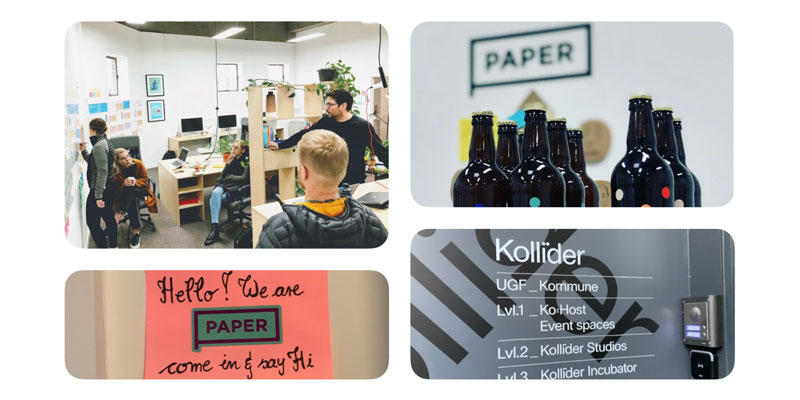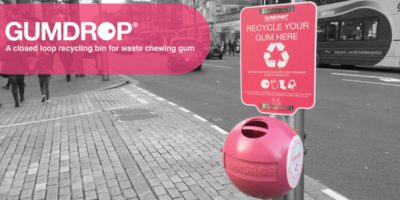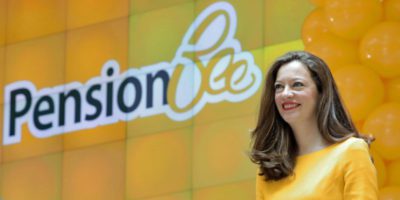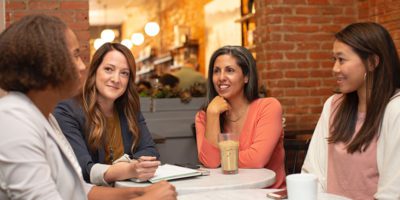Jon Rhodes is a co-founder of Paper, a Sheffield-based user research and design studio. Jon has been delivering projects for over fifteen years. Paper works with organisations including the Department for Education, University of Sheffield, Co-op, Noisy Cricket and Leeds City Council. Paper exists to provide a supportive environment for research and design specialists to work with clients, to learn, to create, and to have fun.
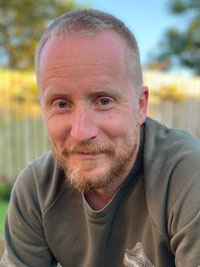
“I don’t understand why anyone would want to actively build a team of the same. The differences, subtle or otherwise, are what makes it all interesting. It’s what makes it all better.”
Meeting the right people
Before Paper, I started working on a youth trainee scheme, an earlier version of apprenticeships, straight after leaving school. I have a National Vocational Qualification (NVQ), but I’ve lost the certificate. It’s probably in my Record of Achievement, wherever that is.
I spent a few years working in a few finance and numbers-based roles. Worked at a bank, got made redundant, and by 2007, I moved onto an e-learning company where someone said I should look at project management roles, as I was very organised. I started my project manager career at that e-learning company, then in a bank, before landing at a digital agency in 2010.
That is where I met Cam and Mark, with whom I started a company that specialises in research and design. It’s called Paper, and we started in 2016.
Happy team, successful company
For anyone in our team that’s not working on a project, we start the week planning out what work or tasks need to be done. It helps focus attention for the next few days ahead. We’re in a nice rhythm at the minute of spending time on making things easier for the next time we do something; writing ‘How to…’ guides, listing questions we’d ask potential partners, speaking with freelancers we’d like to work with…
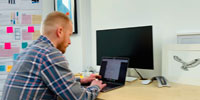
The entire team spends time each week working on a goal of making Paper and our sector a more welcoming and diverse place. We’ve just started working with Sheffield’s See It Be It campaign, which is great. There’s likely to be another workshop in the coming months to help pupils realise the kind of stuff we do. And there’s other great stuff like this video that Urška recorded about being a designer.
I do enjoy working on my own, so occasionally I’ll turn off any distractions and enjoy writing down words that I hope make sense.
As a team, we talk a lot about food. Only yesterday “seacuterie” cropped up. I had to look that
up. We end the week on a Friday as a team catching up on our weeks’, how projects have gone, what sales opportunities we’re working on, and what the following week looks like.
I hope Paper is a wonderful place to work, so I’ll continue spending time doing my best to make that continue.
A relatively smooth transition
We had to act quickly in March 2020, once we realised that things were going to be different for a while. At that time, we had a team working on a project for Leeds City Council and were based on-site in Leeds. We had another team working with the Department for Education in Manchester. I’m really proud of how everyone handled things. Both teams changed their work patterns within a few hours notice.
The team in Leeds brought forward a weeks’ worth of research and did the graft to fit it into a few days so that all the analysis work could be done remotely. The team travelling to Manchester were coming to the end of a 14-month project designing a new service for teachers. It was rubbish not getting a proper chance to say bye and cheers to the teams we’d been working with for so long.
We transitioned smoothly though and I think that’s largely due to us being a small, thoughtful company that really can act quickly. We’d already invested in making sure everyone had a decent kit from the start. We were already using tools (Slack, Miro, Trello, Calendly etc.) that allowed and encouraged remote and asynchronous working. It meant we could move into working from our respective homes relatively easily.
We’ve won some brilliant projects over the past 12 months too: Our biggest contract to date with the Department for Education; two research projects with the University of Sheffield. We’ve continued working with HI Future on their mission to enable inclusive and supportive employment opportunities for people who have and are, experiencing homelessness. We worked with opt-out tools on a legup project to help their team design tools to remove misogyny from social media.
I feel grateful each and every day too. Lots haven’t been as fortunate or lucky. We’ve seen businesses, good businesses, not survive the last year, and that’s a real shame.
Showing what Paper is all about to increase our team’s diversity
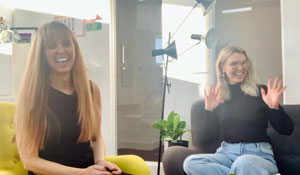
There’s nine of us now and I’m delighted every single day that people choose to work at Paper. I wrote about building a gender-balanced business in this article for Womanthology 2018. It mentions an approach to advertising a job but without the traditional details. We called it The Job with No Name.
I’ve spotted what I now realise is a typo in that article, although it still makes sense when you read it so that’s probably how it slipped through the net – it says “The job advert we put out wasn’t helpful”. It was helpful, it really was. The first four people to join Paper – Urška, Rachael, Beth and Faye – were direct results of posting that job description.
Jen joined us in January this year. She’s a designer and applied for a designer role. Harry joined in April after mentioning he’d like to join permanently after freelancing with us for a while.
With five women and four men in the team, the gender split is pretty even (we’ve never asked how the team identifies their gender, so things might be more fluid than that). But we’re all white. Therefore, there’s more work we’re doing to show what Paper, companies like Paper, and the sector in general, can do for people from different backgrounds. We’re working to make it a more diverse place and there are some things that have started taking off.
I mentioned earlier that we’re working with the See It Be It campaign. There’ll be more videos from the team talking about how they got into their respective roles. It’s all about opening up what we do to as many people as possible.
It’s unlikely a young person wants to grow up to become a project manager. It’s even more unlikely that they’ll want to become a delivery manager. But if we can help show being organised, looking out for people, making sure everyone in a group can be heard, then maybe it’ll encourage someone to look for a specialism that otherwise might have been hidden.
We’ve just finished being part of Diverse and Equal’s 2021 Agile Bootcamp, spending time with a wonderful group of people, with the aim of empowering them to step into a variety of roles in the digital sector.
The Paper team runs a workshop called ‘a beginners guide to research and design’, which has been run for both adults and children at a local school. We’re at the early stages of doing another version of this workshop, aimed at showing younger children the type of work we do. That’s likely to be in school next academic year.
The differences are what keeps it interesting
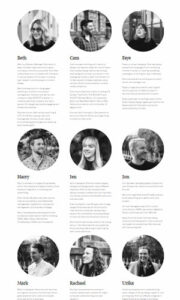
I love the unwavering enthusiasm Urška shows. I love the thoughtfulness of Rachael when she speaks with people. I love the inquisitiveness of Beth, constantly wanting to understand more about what she does. I love every single word Faye has written or spoken. I love how Jen talks about designing with people. I love how Harry makes sure things tick along, every day. I love Cam and Mark dearly, they’re my brothers.
We’re not a boastful company. We’re quietly confident. The people who choose to work here, the clients we work with, the contracts we’ve won – it really is incredible. And those four guiding principles we wrote down over five years ago have held strong.
In our work, we’re always wanting to speak or spend time with people that may struggle, for a lot of reasons, with a service or product or whatever it is we’re working on. We’re always trying to include people in our work that don’t have the loudest voice, so we’ve started from a good place.
Last year we wrote down some words we really believe in. I’ve changed a couple of words, but it sums us up:
‘Every user person is different and we believe, passionately, that every user person counts.’
How joining the Diversity Charter opened our eyes
We signed up to the Diversity Charter in 2017 in the early days of legup.social, a mentoring event we founded to help charities, small businesses and social enterprises. The charter is for event organisers, speakers, individuals, employers, sponsors and venues who are committed to highlighting where there is a lack of diversity at events and doing what they can to make things better.
We wanted to make legup events as accessible as possible and, as we’d never run an event before, looked for all the advice and guidance we could. The charter is simple to sign up to and easy to use. Whilst legup isn’t a speaking event, the considerations for event organisers are really helpful. It made us think about things – venues, format, comms, introductions and everything in between.
The charter also made us think carefully about the events that we attend as a team and those that we’re asked to be part of. We’ve recently had to pull out of an event we were going to talk at as it was only white men. It was the right thing to do. We can do better.
Looking forward
I am excited to carry on trying to make Paper the best place to work for or with. We’ve got a new project just starting which is about research with deaf people. That’s really exciting, really interesting, and a great challenge for the team.
We’re also working with Manchester Digital to organise an event later in the year about how we work with freelancers. That’s lining up to be interesting, not just the topic, but also how to make an event accessible and not fear-inducing once restrictions have eased.
I’m looking forward to spending a few days in the studio once it’s open again. I always look forward to spending time with the team. I imagine food talk will shift from seacuteries back to the greatest soup flavours. And I’m looking forward to a few weeks off, away from screens and spending time with the family, outside.
https://www.linkedin.com/in/mrjonrhodes/

